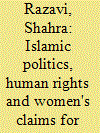|
|
|
Sort Order |
|
|
|
Items / Page
|
|
|
|
|
|
|
| Srl | Item |
| 1 |
ID:
075384


|
|
|
|
|
| Publication |
2006.
|
| Summary/Abstract |
Polemical assertions about the civilisational clash between Islam and Christianity, and Islam's incompatibility with human rights and gender equality are frequently heard these days. Political Islam, however, is far from homogeneous, and the modernist and reformist currents which have emerged in many diverse contexts often seek to embrace both human rights and gender equality. This paper analyses the diverse currents of thinking that feed into the reformist orientation in Iran. The need for change and reform is being voiced not only by secular forces, but also by the 'true believers', who have included male lay intellectuals, some clerical authorities, and a number of feminists with an Islamic orientation. These disparate streams of reformist thinking constitute a genuinely local effort to move Islamic politics out of the cul-de-sac of traditional Islam by endorsing modernist and universal values of human rights, democracy and gender equality. While these emerging voices represent a paradigm shift in Islamic thought, their political impact has been far from significant. The reasons for this weakness are complex, and include both domestic and external factors explored in the second half of the paper.
|
|
|
|
|
|
|
|
|
|
|
|
|
|
|
|
| 2 |
ID:
098987


|
|
|
|
|
| Publication |
2010.
|
| Summary/Abstract |
This article explores how religion as a political force shapes and deflects the struggle for gender equality in contexts marked by different histories of nation building and challenges of ethnic diversity, different state-society relations (from the more authoritarian to the more democratic), and different relations between state power and religion (especially in the domain of marriage, family and personal laws). It shows how 'private' issues, related to the family, sexuality and reproduction, have become sites of intense public contestation between conservative religious actors wishing to regulate them based on some transcendent moral principle, and feminist and other human rights advocates basing their claims on pluralist and time- and context-specific solutions. Not only are claims of 'divine truth' justifying discriminatory practices against women hard to challenge, but the struggle for gender equality is further complicated by the manner in which it is closely tied up with, and inseparable from, struggles for social and economic justice, ethnic/racial recognition, and national self-determination vis- -vis imperial/global domination.
|
|
|
|
|
|
|
|
|
|
|
|
|
|
|
|
|
|
|
|
|